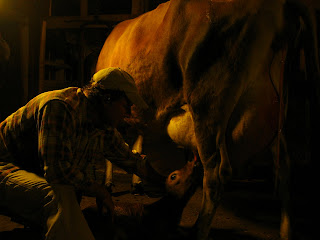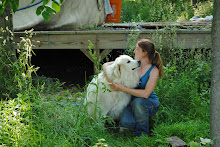It is a good year to be an apprentice at Caretaker farm: we've had buckets of rain almost daily, leading to rampant weed growth in every available patch of soil. New England is naturally a less-than-ideal climate for strawberries, but the rain has been particularly brutal to our berries. Without any chance to dry out between the rain and the overcast days, mold is running rampant in our strawberry beds. Two weeks ago, one of the tires on our smaller cultivating tractor got a puncture, and since tractor tires are filled with liquid calcium (the weight acts as a safety measure to prevent roll-overs), we had to call out special tractor-tire-replacement-mechanics. All other machines on the farm then took their cue from the tractor--the lawn mower died, the washing machine broke, the brand new mixer for the bakery has been a headache from start to finish, and some nasty creature has picked off five of our chickens over the past week and a half.
Meanwhile, on the farm where Andrew is working, their scalder broke repeatedly on a day in which 300+ chickens were scheduled for processing, the replacement scalder sputtered in and out of service so that only 120 could be completed, and 450 beef cows escaped from their pasture, where 8 then wandered into the path of an oncoming AMTRAK train. The train won.
I'm not being ironic though, it is a good year to apprentice both here at Caretaker and there at Polyface.
 If this were one of those lucky years where our greatest worry is what to do with our excess lettuce, our education as farmers would be sorely lacking. In reality, something is usually less than ideal on a functioning farm. If the weather is perfect, the machines break; if the machines run like clockwork then you might want to start monitoring the weather radar more closely for those unexpected storms. It can become infuriating and depressing, but unless you learn how to accept the inevitable, problem-solve a jerry-rigged solution, grit your teeth and work a little bit harder, you will begin to lose your mind. But once you emerge on the other side--to a sunny Sunday, when you wave goodbye to the mixer and hop on a borrowed mower to tool around the yard--you'll appreciate good fortune more than ever. And when, in the evening, your milk cow gives birth to a spindly, big-eyed, wet-nosed calf, your prayer of thanksgiving will be as natural as the throbbing call of the bullfrogs outside.
If this were one of those lucky years where our greatest worry is what to do with our excess lettuce, our education as farmers would be sorely lacking. In reality, something is usually less than ideal on a functioning farm. If the weather is perfect, the machines break; if the machines run like clockwork then you might want to start monitoring the weather radar more closely for those unexpected storms. It can become infuriating and depressing, but unless you learn how to accept the inevitable, problem-solve a jerry-rigged solution, grit your teeth and work a little bit harder, you will begin to lose your mind. But once you emerge on the other side--to a sunny Sunday, when you wave goodbye to the mixer and hop on a borrowed mower to tool around the yard--you'll appreciate good fortune more than ever. And when, in the evening, your milk cow gives birth to a spindly, big-eyed, wet-nosed calf, your prayer of thanksgiving will be as natural as the throbbing call of the bullfrogs outside.
Meanwhile, on the farm where Andrew is working, their scalder broke repeatedly on a day in which 300+ chickens were scheduled for processing, the replacement scalder sputtered in and out of service so that only 120 could be completed, and 450 beef cows escaped from their pasture, where 8 then wandered into the path of an oncoming AMTRAK train. The train won.
I'm not being ironic though, it is a good year to apprentice both here at Caretaker and there at Polyface.
 If this were one of those lucky years where our greatest worry is what to do with our excess lettuce, our education as farmers would be sorely lacking. In reality, something is usually less than ideal on a functioning farm. If the weather is perfect, the machines break; if the machines run like clockwork then you might want to start monitoring the weather radar more closely for those unexpected storms. It can become infuriating and depressing, but unless you learn how to accept the inevitable, problem-solve a jerry-rigged solution, grit your teeth and work a little bit harder, you will begin to lose your mind. But once you emerge on the other side--to a sunny Sunday, when you wave goodbye to the mixer and hop on a borrowed mower to tool around the yard--you'll appreciate good fortune more than ever. And when, in the evening, your milk cow gives birth to a spindly, big-eyed, wet-nosed calf, your prayer of thanksgiving will be as natural as the throbbing call of the bullfrogs outside.
If this were one of those lucky years where our greatest worry is what to do with our excess lettuce, our education as farmers would be sorely lacking. In reality, something is usually less than ideal on a functioning farm. If the weather is perfect, the machines break; if the machines run like clockwork then you might want to start monitoring the weather radar more closely for those unexpected storms. It can become infuriating and depressing, but unless you learn how to accept the inevitable, problem-solve a jerry-rigged solution, grit your teeth and work a little bit harder, you will begin to lose your mind. But once you emerge on the other side--to a sunny Sunday, when you wave goodbye to the mixer and hop on a borrowed mower to tool around the yard--you'll appreciate good fortune more than ever. And when, in the evening, your milk cow gives birth to a spindly, big-eyed, wet-nosed calf, your prayer of thanksgiving will be as natural as the throbbing call of the bullfrogs outside.



No comments:
Post a Comment